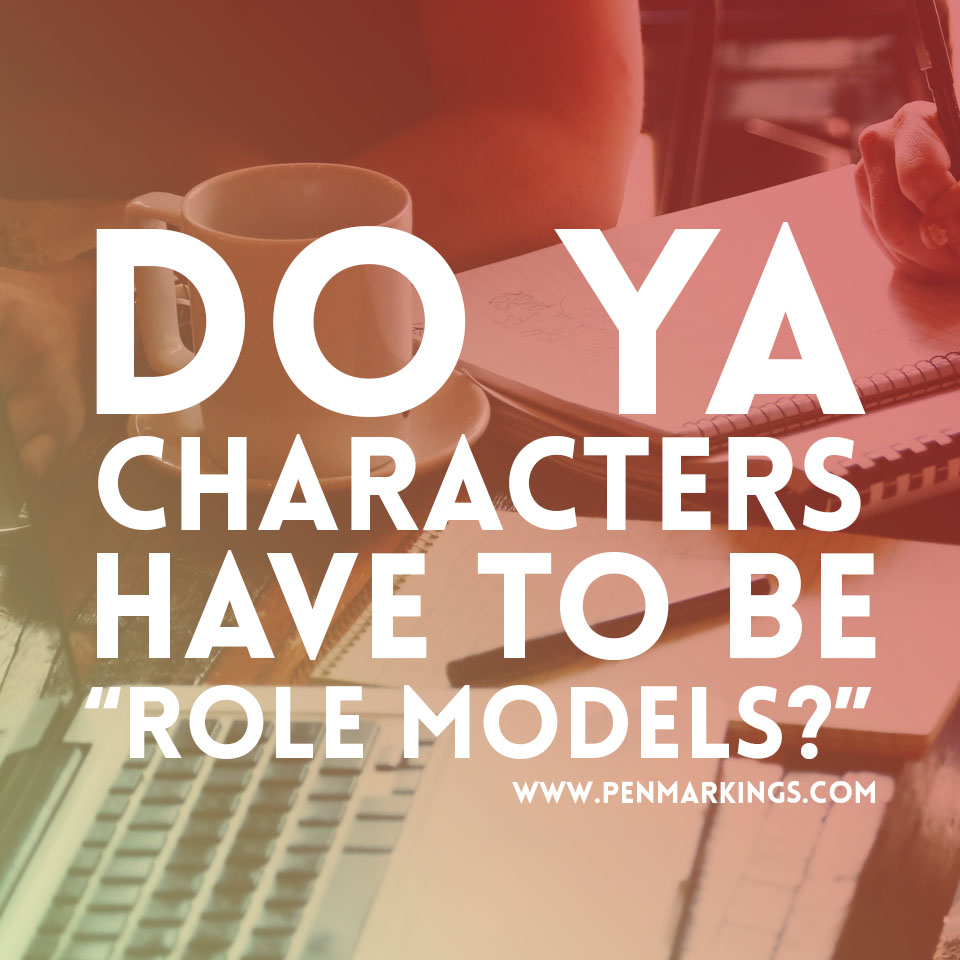
I’m not even sure where I saw this description.
Once, maybe twice, maybe a handful of times. Here and there, scattered around several books that it really shouldn’t have stuck in my mind.
But it did?
I mean, it did.
I was utterly confused, at first, seeing that comment. YA characters? As role models? Never even crossed my mind. There are a great deal of characters I love – but they aren’t exactly “role model” material, and it’s never occurred to me to look out for characters who are “role model” material either.
Truthfully, I think it’s pointless to try to make YA characters as role models.
One of the big reasons I read YA is to see myself – me, with all my wonderful problems and questionable morals – and I sure as hell ain’t worthy of being a role model. And if authors suddenly start churning out books with, y’know, Perfect Sue or Perfect Joe from down the street who you absolutely must adore because look, what a great role model! I’d probably roll my eyes hard enough for a migraine.
Sure, make them nice, make them with good personalities that every parent wants ingrained in their child, but don’t make them “role models.” That’s like disguising a “How to Behave” pamphlet as a YA book and shoving it down teens’ throats. Not fun. Not pleasing. And certainly not what I signed up for when I picked up a YA book.
It’s not like I’m saying write a book where it doesn’t show the consequences of things; not at all. Those books with consequences shown in all their harsh reality can service as an abrupt wake-up call, which I think some of us may need (myself included.) But it shouldn’t read like a commercial: “See, kids? That’s what not to do! It’s bad, very bad! Be like Perfect Joe so this will never happen to you!”







Like you, I see YA characters as people I can relate to. People who, like me, make mistakes, get confused and try to make sense of their life. And I have to say that I do get turned off while reading if a character is too perfect. Characters have the right to be better than me, and that’s cool. But I hate it when authors make a point of describing their characters in a way that make it seem like they’re saying “look at Angela over here! A REAL angel! That’s what a teen should be like!”.
For example, characters that don’t curse. If I don’t see a swear word in a YA book, I probably won’t even realize it. But when an author makes a point of making their character explain WHY they don’t swear, and make them use dumb replacement such as “strudel” instead of “shit”, then I get upset. You go walk into a high school and tell me you didn’t hear at least one kid say “fuck”.
Making characters look like sweet and innocent people is stupid, because we’re not. We are in a stage so confusing that we sometimes have trouble seeing past our noze. And guess what? If I hit my little toe on a sharp edge, I won’t say “silly crackers”, you can trust me on that one.
Sophie recently posted…Pass me the remote so we can rewind a bit -one year blogiversary!-
Yes! I mean that’s why nobody likes Mary Sues or Gary Stus. Perfect =/= relatable. And having authors paint there characters as this ‘golden one’ is a major turn-off. What does that mean for all the other teens, who’re not like sweet ol’ Angela?
I agree, I usually don’t notice it unless stupid stuff goes in as a replacement. Then it’s just annoying. Maybe if it fits them, I guess (like some kid from a super-conservative family) but there has to be a ‘fuck’ somewhere there. You can’t have all the teens saying censored shit.
This is such an interesting question! For me personally, I love my characters to be realistic. Nobody’s perfect, and it makes it more believable when characters have flaws just like you or me. When they’re just flawless and perfect all the time it makes them hard to relate and connect to. Thanks for sharing and, as always, fabulous discussion! <3
Zoe @ Stories on Stage recently posted…The Problem with Forever
I wrote a post about this topic awhile ago (2013!), and I’m planning to write a follow-up post soonish because I keep seeing the same comments about books in reviews or on social media. On one hand, I understand that generally people have certain moral expectations of children’s literature (in which I include YA). We know young people are influenced by what they read. We know that WE were profoundly influenced by what we read when we were children. So we want “good” things to be promoted.
However, I think there’s room for a little more variety in YA, especially if as a group we want to argue that YA is quality literature. Letting YA really be art means not confining it to promoting (or even just showing) certain things. We can’t demand certain types of protagonists and happy endings.
On my post, commenters basically said that they don’t mind if a YA character does wrong things, but they need to change by the end. I like those types of stories, too, but that’s not the only type of story. And that’ still demanding YA characters be role models. It’s also been extending to things beyond “I don’t want my protagonists to be thieves and liars.” People RIOT if they see, for instance, a YA book where a girl doesn’t like her weight because it’s a “bad example for teens.” But that’s reality. Some teens don’t like how they look. And, yeah, it’s great and inspirational if they come to love their bodies by the end. But they don’t have to. That doesn’t make it a bad book. Or the character a bad person. Or the author a person who’s promoting body hate and eating disorders. The reality is that some teens who dislike their bodies STILL dislike their bodies when they leave high school. It takes some people many years to learn to love themselves. And I honestly see no reason why that can’t be represented in a YA book.
https://pagesunbound.wordpress.com/2013/01/11/writing-rambles-should-ya-characters-be-role-models/
One question I’ve always had in the back of my mind is why YA readers constantly LOOK for role models. I mean, adults who read adult fiction don’t do that (well, not the majority of the time anyway). YA readers need to let their search for role models go. No human is perfect, so role models don’t even truly exist.
I love this. I completely agree. I think it is much more important that characters are REAL.
This article achevied exactly what I wanted it to achieve.
I believe it is valuable for younger kids to have role models in their books but as for YA, I personally have never been that influenced by what a character does. I think it’s much more relatable and interesting when a character isn’t written to be the perfect role model that we should all want to be. I’m intrigued by characters who live wild lives and the characters who’ve made mistakes in the past. I like my characters flawed like me and every other reader. This is an interesting post and not something I’d given that much thought to before.
Det receptet är sÃ¥ gott :)! Ville bara säga att din blogg är grymt bra, mÃ¥nga recept och den inspirerar mycket! 🙂
I see you don’t monetize your site, don’t waste your traffic, you can earn additional
cash every month because you’ve got high quality content.
If you want to know how to make extra $$$, search for:
Mertiso’s tips best adsense alternative
LastBerry recently posted…LastBerry
I have checked your website and i’ve found some
duplicate content, that’s why you don’t rank high
in google, but there is a tool that can help you to create 100% unique
content, search for; Boorfe’s tips unlimited content
JamilaSmall recently posted…JamilaSmall
I have checked your blog and i’ve found some duplicate content,
that’s why you don’t rank high in google’s search results,
but there is a tool that can help you to create 100% unique content, search for; Best article rewritwer
Ercannou’s essential tools
AdolphChief recently posted…AdolphChief
I have noticed you don’t monetize your page,
don’t waste your traffic, you can earn extra bucks every month.
You can use the best adsense alternative for any type of website (they approve all websites), for more info simply search in gooogle: boorfe’s tips monetize your website
BestToni recently posted…BestToni